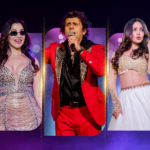“Cinema is a potent medium of expression. We can’t keep telling the same stories year after year,” the actor believes, as he hopes that Junglee Pictures’ Badhaai Do, which is currently in theatres, will bring about some social change.
What led you to Badhaai Do in the first place?
Harsh (director Harshavardhan Kulkarni) and I both graduated from the same film school (FTII, Pune). He was my senior at the time, so I knew him. I was enthralled by the story of Badhaai Do from the minute he told it to me. It’s fantastic. It’s one of the best scripts I’ve ever seen. This is, without a doubt, one of the best films I’ve ever seen. We were all in tune, whether it was Bhumi Pednekar and I doing our readings together or everyone on set. This film was a lot of fun to make. We had an absolute blast. People may say it’s only one film, but Harsh, Bhumi, and I will be lifelong friends.
https://www.instagram.com/p/CZyogDMIbgs/
What do you hope the film will achieve, other than conveying a fantastic story?
The fim delivers an important story in a lighthearted and entertaining manner. It makes a difference how a narrative is told. The humour is well-crafted. Along with being entertaining, the film’s second half is also very emotional. I can assure you that this video will be remembered for a long time. Even though we’ve gone a long way, there is still a lot of discrimination and stigma around LGBT people. We are optimistic that this film will effect change. I’m not suggesting things will change quickly, but if even a few people change their minds as a result of our film, that’s fantastic.
How did you approach the role of Shardul as a straight man playing a gay character?
I want to accomplish everything as an actor. That is my responsibility. My characters are very important to me. I don’t want to limit myself in any way. I had a lot of gay pals, so I had enough of examples. I attempted to figure out what people anticipate from society and what it’s like to come out or stay in the closet. As an actor, you also draw heavily on your personal experiences with things and people. Shardul, my character, isn’t caricaturish in any way. He is a powerful, manly man who is also gay. There are a lot of gay males like Shardul out there.
Isn’t there anything more to Shardul than his sexual orientation?
Shardul’s story is one that many of us can relate to. We want to be something, yet owing to family and societal pressure, we don’t succeed, and we are unhappy as a result. Shardul aspires to be Mr India and works hard to achieve his goal, but due to familial obligations, he must settle for a government position. He does it earnestly, but he secretly regrets not having been able to pursue his ambitions.
What, in your opinion, makes the film a family-friendly film?
It encapsulates the essence of a typical Indian middle-class household. One is from Shardul’s family, while the other is from Sumi’s. I was not subjected to this, but after a child reaches the age of 30, most Indian families begin to put pressure on them to settle down.’ Sumi and Shardul are trapped in the same scenario, which adds to the intrigue. Both of them were brought up in a certain way. Shardul was born into a blended family. Because he is the family’s only son, he is spoiled and safeguarded. Both have been socialised to value middle-class values, and situational humour is a result of this.







